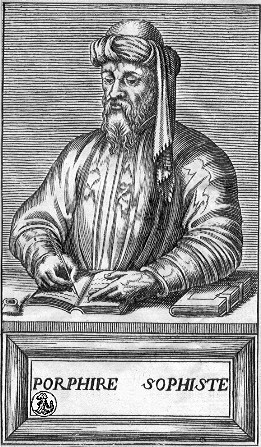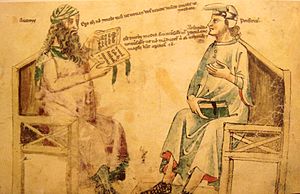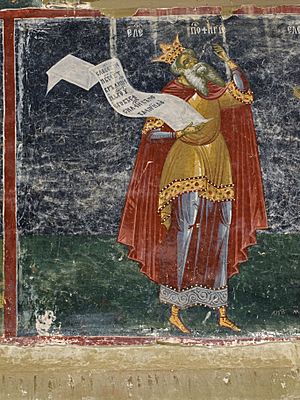Porphyry (philosopher) facts for kids
Quick facts for kids
Porphyry of Tyre
|
|
|---|---|

Porphire Sophiste, in a French 16th-century engraving
|
|
| Born | c. 234 AD |
| Died | 305 (aged 70–71) |
|
Notable work
|
List
Introduction to Categories (Εἰσαγωγή; Introductio in Praedicamenta or Isagoge et in Aristotelis Categorias commentarium), The Life of Pythagoras (Πυθαγόρου βίος; Vita Pythagorae), On Abstinence from Animal Food (Περὶ ἀποχῆς ἐμψύχων; De Abstinentia ab Esu Animalium), On the Cave of the Nymphs in the Odyssey (Περὶ τοῦ ἐν Ὀδυσσείᾳ τῶν Νυμφῶν Ἄντρου; De Antro Nympharum), Introduction to Ptolemy's Tetrabiblos (Εἰσαγωγὴ εἰς τὴν Ἀποτελεσματικὴν τοῦ Πτολεμαίου), Commentary on Ptolemy's Harmonics (Εἰς τὰ ἁρμονικὰ Πτολεμαίου ὑπόμνημα), On the Life of Plotinus and the Arrangement of his Work (Περὶ τοῦ Πλωτίνου βίου καὶ τῆς τάξεως τῶν βιβλίων αὐτοῦ; Vita Plotini), Starting-points leading to the intelligibles (Ἀφορμαὶ πρὸς τὰ νοητά; Sententiae ad intelligibilia ducentes), Philosophy from Oracles (Περὶ τῆς ἐκ λογίων φιλοσοφίας; De Philosophia ex Oraculis Haurienda), Against the Christians (Κατὰ Χριστιανῶν; Adversus Christianos)
|
| Era | Ancient philosophy |
| Region | Western philosophy |
| School | Neoplatonism |
|
Main interests
|
Metaphysics, astrology |
|
Notable ideas
|
Porphyrian tree, criticism of Christianity, vegetarianism |
|
Influenced
|
|
Porphyry of Tyre (born around 234 AD, died around 305 AD) was an important Neoplatonic philosopher. He was born in Tyre, which was part of the Roman Empire at the time.
Porphyry is famous for editing and publishing the works of his teacher, Plotinus. This collection, called The Enneads, is the only set of Plotinus's writings that we have today. Porphyry also wrote many of his own books in Greek. These books covered a wide range of topics, from music theory to the ancient Greek poet Homer, and even vegetarianism.
His book Isagoge, which means "Introduction," was a key textbook for logic and philosophy. It was used for hundreds of years in the Middle Ages after being translated into Latin and Arabic. Porphyry was also known for his strong opinions against early Christianity. He wrote books like Philosophy from Oracles and Against the Christians. The Roman Emperor Constantine the Great later banned Against the Christians.
Contents
Porphyry's Life and Studies
Porphyry was born in Tyre. His parents named him Malkos, which means "King" in his native language, Aramaic. Later, he changed his name to Basileus, which means "King" in Greek. He also used the nickname "Porphyrius," meaning "Clad in purple."
He studied grammar and public speaking in Athens with a teacher named Cassius Longinus. During this time, he learned about Middle Platonism, an older form of Plato's philosophy.
In 262 AD, Porphyry moved to Rome. He was drawn there by the fame of Plotinus, a leading philosopher of the time. For six years, Porphyry dedicated himself to studying Neoplatonism with Plotinus. He even changed his diet a lot during this period. Plotinus eventually advised him to move to Sicily for five years to improve his mental health.
After returning to Rome, Porphyry taught philosophy. He also finished editing Plotinus's writings, as Plotinus had passed away. He wrote a biography of his teacher too. Some ancient writings say that Iamblichus was Porphyry's student. However, it's more likely that Iamblichus was simply the next important philosopher after Porphyry. The two philosophers disagreed publicly about a practice called theurgy, which involved trying to connect with gods through rituals.
Later in his life, Porphyry married Marcella. She was a widow with seven children and loved studying philosophy. Not much else is known about Porphyry's later years, and the exact date of his death is not certain.
Porphyry's Important Works
Porphyry wrote many books on different subjects. Here are some of his most famous contributions.
Introduction (Isagoge)

Porphyry is best known for his work in philosophy. One of his most important books is called Introduction (or Isagoge). This short book is often seen as a guide to Aristotle's book Categories.
However, the Isagoge was actually an introduction to logic in general. It explained how to classify qualities of things. It famously broke down the idea of "substance" into five parts: genus, species, difference, property, and accident.
This book was very important because it brought Aristotle's logic into Neoplatonism. Boethius translated Porphyry's Isagoge into Latin. This Latin version became a standard textbook in European schools and universities during the Middle Ages. It helped shape how logic was studied and led to discussions about "universals" (general concepts that apply to many things).
In medieval textbooks, a diagram called the Arbor porphyriana (or "Porphyrian Tree") showed his logical way of classifying things. Even today, the ideas from Porphyry's Tree are used in taxonomy, which is how we classify living organisms.
The Introduction was also translated into Arabic. It became a key logic textbook in the Muslim world. It influenced the study of religion, philosophy, and law. Porphyry's ideas about "accident" (a quality that is not essential to something) also started a long debate about the difference between what is "essential" and what is "accidental."
Philosophy from Oracles
Porphyry was also known for being against Christianity and for defending Paganism. We can learn about his philosophical views on traditional religion from parts of his book Philosophy from Oracles. This book originally had three parts.
Scholars debate whether he wrote this book when he was young or closer to the time when Christians were persecuted under emperors like Diocletian. The parts of Philosophy from Oracles that we have today are only known because Christians quoted them to argue against Porphyry. These parts discuss things like proper ways to offer sacrifices and the nature of astrological fate.
Against the Christians
While living in Sicily, Porphyry wrote his most famous work against Christianity, called Against the Christians. This book had fifteen parts. About thirty Christian writers, like Augustine and Jerome, wrote responses to Porphyry's arguments.
We know about Porphyry's arguments mostly from these responses. This is because Emperor Theodosius II ordered every copy of Against the Christians to be burned in 435 AD and again in 448 AD.
Some historians, like Augustine, believed that Porphyry was once a Christian himself.
Other Writings
Porphyry disagreed with his student Iamblichus about theurgy. Iamblichus's writings often defended the idea of connecting with gods through rituals against Porphyry's criticisms. The French philosopher Pierre Hadot said that Porphyry believed spiritual exercises were very important for a person's spiritual growth.
Like Pythagoras, Porphyry supported vegetarianism for spiritual and ethical reasons. These two philosophers are perhaps the most famous vegetarians from ancient times. Porphyry wrote a book called On Abstinence from Animal Food. In this book, he argued against eating animals. His ideas are still mentioned in vegetarian writings today.
Porphyry also wrote a lot about music theory, astrology, religion, and philosophy. He created a History of Philosophy which included biographies of philosophers, like his teacher Plotinus. His book Vita Pythagorae about the life of Pythagoras is different from a book with the same name written by Iamblichus. His comments on Ptolemy's Harmonics are a key source for understanding ancient music theory.
Porphyry also wrote about Homer, the ancient Greek poet. Two of his texts about Homer still exist: the Homeric Questions (which comments on the Iliad and Odyssey) and On the Cave of the Nymphs in the Odyssey.
See also
 In Spanish: Porfirio para niños
In Spanish: Porfirio para niños
- Basilides of Tyre
- Macarius Magnes – his work Apocriticus contains a series of excerpts from Porphyry's Against the Christians
- 4th century in Lebanon
 | Valerie Thomas |
 | Frederick McKinley Jones |
 | George Edward Alcorn Jr. |
 | Thomas Mensah |


